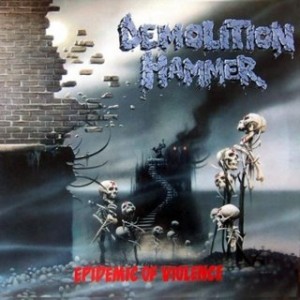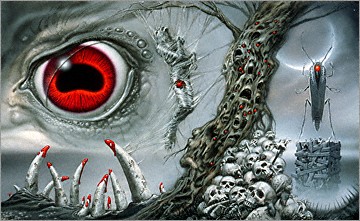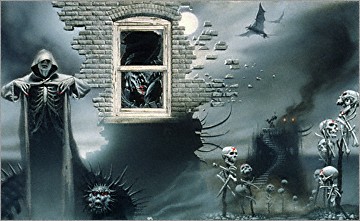 1. Introduction: The Northernmost Death Metal
1. Introduction: The Northernmost Death Metal
2. Those Once Loyal: The Last Stand of the Underground
3. Lie In Ruins: Swallowed by the Void
4. Devilry: Rites for the Spring of Supremacy
5. Slugathor: Echoes from Beneath
6. Deathspawned Destroyer: WarBloodMassacre
7. Sepulchral Aura: Demonstrational CD MMVII
8. Ascended: The Temple of Dark Offerings EP
9. Hooded Menace: Fulfill the Curse
10. The Lords of the Shadow Realm: The Future of Finnish Death
Written by Devamitra with Tuomas K. (Lie in Ruins), Ilmari Jalas (Slugathor), Lasse Pyykkö (Hooded Menace), Teemu Haavisto (Deathspawned Destroyer), J. Partanen (Sepulchral Aura), Juuso Lautamäki (Ascended) and Sir Holm (Devilry)
Introduction: The Northernmost Death Metal

Shattering the stasis of human evolution
Pioneering man of god-like stature
Erase and improve the temple foundation
Annihilate the meek, empty and inferior
– Devilry, Ouroborous Coiling
Some of us remember Finland as it was in my early youth; a humble country, tormented by Russia’s eternal presence, influenced by American dreams, taciturn men stubborn in idealism, tainted by alcohol and madness, working to preserve the ambiguous myths of freedom and independence while searching for truths in a society where the rules of piety and devotion did not apply anymore.
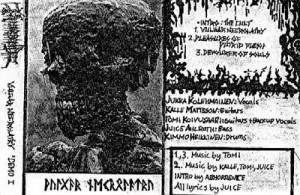 Out of the silence and the cold of wintry nights arose wolven howls, bestial growls and the electric screech of demoniac strings. Clandestine groups scattered across the lake-adorned strip of land which was too vast in area for the people to be in constant touch except by phone and letter, took to the newest musical movement to inherit the throne of the kings of headbanging and thrash: grindcore. Xysma from Turku played Carcass inspired devolved bursts of groovy noise with the mechanical straightforward approach upon which Finnish industrial corporations later built their reputation.
Out of the silence and the cold of wintry nights arose wolven howls, bestial growls and the electric screech of demoniac strings. Clandestine groups scattered across the lake-adorned strip of land which was too vast in area for the people to be in constant touch except by phone and letter, took to the newest musical movement to inherit the throne of the kings of headbanging and thrash: grindcore. Xysma from Turku played Carcass inspired devolved bursts of groovy noise with the mechanical straightforward approach upon which Finnish industrial corporations later built their reputation.
Abhorrence, eventually to be mutated into an exploration of battle and folk attitudes in Amorphis, was among the first Death Metal formations in the real Scandinavian style. Morbid demos from around Finland swarmed like an infestation of maggots. The next few years’ worth of offerings continue to mesmerize and awe fans of old school Death Metal worldwide: Funebre, Sentenced, Disgrace, Phlegethon, Purtenance, Adramelech, Mordicus, Necropsy, Demigod, Vomiturition, Convulse, Depravity, Lubricant, Cartilage, Wings, Demilich and others.
Tuomas K.: I think it was a sort of tribute to our favorite bands in our case back when we started playing in 1993. We were heavily into the early 90′s Death Metal bands so it was kind of natural for us to give it a go, since we’ve had started trying to play our instruments only a couple of years earlier. There were only me and Roni S. playing back then and we never really intended to find another member back in the 90′s. But if we should’ve wanted another member to play, I think it would’ve been pretty hard to find one, because I think we knew only a few guys that were into Death Metal from our neighborhood. Then again, when Lie in Ruins started “for real” in the new millennium it was easier to get a lineup together.
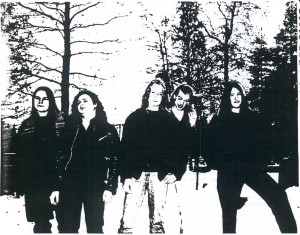 Jalas: I can agree on that this was the strongest period for the music and most of it died in the mid 1990′s when Black Metal music “took over” the underground. For me it is still a bit hard to analyze all this. I have always listened to what I want and when I want. I’m not saying that I didn’t have Black Metal seasons, but bands like Slayer and Morbid Angel were always there, lurking behind (both in my record player and as recording artists).
Jalas: I can agree on that this was the strongest period for the music and most of it died in the mid 1990′s when Black Metal music “took over” the underground. For me it is still a bit hard to analyze all this. I have always listened to what I want and when I want. I’m not saying that I didn’t have Black Metal seasons, but bands like Slayer and Morbid Angel were always there, lurking behind (both in my record player and as recording artists).
Death Metal as an item of fashion soon trailed away and the sonic temples formed by groups of school friends split up or moved on to styles better appreciated by their peers. Drinking alcohol in frozen woods and abandoned cellars while scrawling prayers to darkness and exhaling riffs of death was replaced by jobs, families and military service. Most of the cheap labels went out of business since B grade grindcore and Death Metal where not profitable anymore, dooming many of the aforementioned relics of the scene to obscurity until a partial resurrection through reissues and MP3 hubs.
Pyykkö: Finnish bands got tired of playing Death Metal and wanted to be something that they really couldn´t master very well. It was quite embarrassing shit to watch in some cases.
Those Once Loyal: The Last Stand of the Underground
The chromatic, fiery madness of original Death Metal was too much for the glamour-seeking generation who caught glimpses of extreme metal through the media attention of Black Metal and the TV exposure of “Gothenburg” and gothic metal. Other fans disregarded the old groups for their lack of consistency and humorous appearance, complete with interviews that often read like a discussion of retards in a hangover attempting a foreign language. But as always, true spirit is elusive and the self-importance of the new scene was hardly a better choice in life.
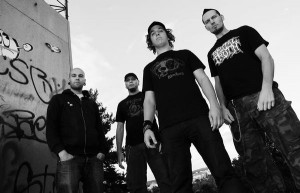 Not many of the original Death Metal fans were enthusiastic about Children of Bodom’s sappy power metal infiltration of Gothenburg techniques or Rotten Sound’s mechanical drum clinic grindcore. Nevertheless, the next generation of longhairs were inspired by these bands who had mastered the latest techniques of production perfect for a violently loud catharsis in car stereo or as a video game soundtrack. It was escapist, but not the Yuggothian dreams of a Demigod. In this case, influenced by groove metal and speed metal, commercial Death Metal sought to act as a youth counselor, harnessing hate and psychotic religion into the individualism of I don’t give a fuck and the various related ethical systems of liberalism.
Not many of the original Death Metal fans were enthusiastic about Children of Bodom’s sappy power metal infiltration of Gothenburg techniques or Rotten Sound’s mechanical drum clinic grindcore. Nevertheless, the next generation of longhairs were inspired by these bands who had mastered the latest techniques of production perfect for a violently loud catharsis in car stereo or as a video game soundtrack. It was escapist, but not the Yuggothian dreams of a Demigod. In this case, influenced by groove metal and speed metal, commercial Death Metal sought to act as a youth counselor, harnessing hate and psychotic religion into the individualism of I don’t give a fuck and the various related ethical systems of liberalism.
It is appropriate that while studio musicians’ and record label executives’ fake Death Metal from Helsinki was climbing the charts, the real good stuff started happening in the underground. Black Metal, as always, was an anti-social reaction to commercialization and the turn of the decade saw a resurgence of Finnish devil worshippers returning to the blasphemous sounds of Bathory and Darkthrone. The travesties at large left people wondering if Death Metal was truly dead and unable to bestow any more bloody and sacral offerings to the underground. This is where the morbid cults under our scrutiny enter the field.
Jalas: In the beginning of Slugathor our line-up was the same as the one we had before we started to play Death Metal. But soon we dropped one guitar player and only had 4 members in the band for a while. Our original vocalist, an esoteric person, Nebiros, was an important member in the beginning and wrote really
non-typical more philosophical lyrics than was heard in typical Death Metal at the time. Also the universe, our seen nature and all experiences influenced us, besides the spoiled “metal scene” that was in the late 90′s, which was also indeed very influential in a way. Definitely I would describe our approach more
brutal than most of the other bands we heard from Finland. This is one of the reasons to start the band like this, besides ultimate passion and love for the genre.
Haavisto: In fact the birth of Deathspawned Destroyer was a mere accident. We had meant to just play any kind of metal, in order to have some additional instrumental practice considering our other bands and so we decided to play Death Metal or a related style with Kai Lehtinen. Death Metal was a rather obvious choice because of a our mutual interest in the genre and the aim was to sound alike to old Cannibal Corpse, Blood, Autopsy etc. without any ambition to create something unique. However we started to churn out a great amount of songs, one each new rehearsal. Then we decided to make up a name for the band and we found a good one from a Cannibal Corpse album title: Bloodthirst. That’s what we were called at the time we did our first demo “Reign of Terror”. The demo sounds exactly like it was supposed to and the overall sound is like we meant it to be. The vocals were supposed to be brutal enough and the sound had to be muddy. To the surprise of both of us someone wanted to release our album. At this point we noticed that there were a few other Bloodthirsts around so we decided to go for a name that no-one else would have for sure, ending up with Deathspawned Destroyer. Originally it was Deathspawn Destroyer but we are told that it’s grammatically bullshit so we added the “-ed”, which still doesn’t sound as good to me as the wrongly spelled one. But anyway the band was born by accident, me and Lehtinen totally agree on the spirit.
Partanen: In 2004-2006 I had been doing a few ambient releases and when those projects hibernated, I had a fresh vision back into the darkness of Death Metal magic. I don’t know exactly what the inspiration for Sepulchral Aura was. There was a vision which commanded itself to manifest through my fleshly vessel and I’m glad it happened.
Lautamäki: Before we got our singer Ascended played some kind of mixture of thrash and Death Metal. Things started to evolve towards traditional Death Metal when we started to discover Finnish gems like Abhorrence, Amorphis, Demigod, Demilich. The sound of those bands was very immense. It was dark, heavy and still maintaining some very mystical quality to it. The only thing left to do was to create and emulate same atmospheres like those records have and introduce our own vision of Death Metal to the world. The hardest part of completing the lineup was to get a decent singer. When Tommi contacted us and joined in it was clear after few rehearsals that the lineup was perfect.
Pyykkö: The idea to form Hooded Menace happened more less by an accident during our Candlemass jam sessions. Instead of melodic vocals we used Death Metal grunts. It was fun to play and worked pretty well so we thought why not to make our own band that would would combine the elements of Doom and Death Metal. I have been wanting to do something like this for a long time. So that three-piece jam session group became the lineup for the “Fulfill the Curse” album.
Holm: Our guitarist Grave’s urge for self-expression and inexhaustible well of riffs is what ultimately inspired the birth of Devilry. Everything else is inconsequential and not of great importance at all.
The new millennium saw a legion of astute musicians interested in unleashing explosive, severe and gripping metal without taking part in the pretense of the new generation of Black Metal. In many ways, the sacred and primal integrity of old school metal had collapsed because widespread attention had created an unstable communal atmosphere of unclear and mismatched intentions. That is why most of what we hear in mainstream media regarding new metal is irony, jokes about “true metal” and meta-metal bullshit filled with endless self-references. Yet, a strong web of personal contacts, by letter, phone or Internet, fueled the fires of Death Metal, along with a fanatically devoted fan base.
Lie in Ruins: Swallowed by the Void
 The veteran Death Metallers from Olari practiced and mastered their Scandinavia influenced art for 15 years before their first release on a label, the impressive “Architecture of the Dead” EP featuring older compositions. While this unique band seemed to receive very little promotion, disciples prayed for the day of reckoning when this constellation could bestow their malevolence in full force upon the wretched scene. The long, exhausting spell “Swallowed by the Void” was to be the definitive answer to these inquiries. Sluggish, conjuring and micro-melodic abyss anthems pay unyielding tribute to the likes of Dismember and Grotesque, aiming for an evil glory that betrays the way death metal lost the innocent meddling in dark arts prevalent in the late 80’s and discovered serious ideologies by the force of contamination and crossbreeding with Black Metal. Especially the progressive moods of the deadly closing track “Bringer of Desolation”, reminiscent of the Lovecraftian horror pathos of the longer tracks by Nile deserves an inclusion in the Death Metal canon of the decade. Serious catacomb dwelling fans of Repugnant and Necros Christos will feel completely at home with Lie in Ruins’ atmospheric, sacral method of composition which eschews fast and classical parts, but returns to the Sabbath-ian roots of primal death doom experience.
The veteran Death Metallers from Olari practiced and mastered their Scandinavia influenced art for 15 years before their first release on a label, the impressive “Architecture of the Dead” EP featuring older compositions. While this unique band seemed to receive very little promotion, disciples prayed for the day of reckoning when this constellation could bestow their malevolence in full force upon the wretched scene. The long, exhausting spell “Swallowed by the Void” was to be the definitive answer to these inquiries. Sluggish, conjuring and micro-melodic abyss anthems pay unyielding tribute to the likes of Dismember and Grotesque, aiming for an evil glory that betrays the way death metal lost the innocent meddling in dark arts prevalent in the late 80’s and discovered serious ideologies by the force of contamination and crossbreeding with Black Metal. Especially the progressive moods of the deadly closing track “Bringer of Desolation”, reminiscent of the Lovecraftian horror pathos of the longer tracks by Nile deserves an inclusion in the Death Metal canon of the decade. Serious catacomb dwelling fans of Repugnant and Necros Christos will feel completely at home with Lie in Ruins’ atmospheric, sacral method of composition which eschews fast and classical parts, but returns to the Sabbath-ian roots of primal death doom experience.
Devilry: Rites for the Spring of Supremacy
 One of the most anti-social and least compromising commando squads from Finland in any musical genre, Devilry’s series of EP’s cumulated during the decade into an impressive demonstration of technical and lyrical ability that converted hordes of Black Metal listeners into old school Death Metal and vicious thrash. Like a less confused “The Laws of Scourge” era Sarcofago, Devilry abstains from long buildups to frame scenes of street violence and political upheaval in robotically symmetric percussion and inhuman, precise, spouting syllables of learned rhetoric. One of the fastest Finnish metal bands, at least in overall impression, Devilry quotes Slayer for a reductionist but holistic approach to songwriting which means that each song is built from a clearly defined set of riffs arranged to unleash the most powerful experience of intensity on the listener, while Sir Holm’s text praises the law and order of a reich that would be built according to the code of the warrior and rule of the naturally supreme. Essays could be written about Devilry’s interest in beauty, as despite the feral character of the music all songs are geometrical complexes with no loose parts hanging and even the cover picture is a serene, celestial scene incorporating Finnish functionalist architecture. Even the condemnation and hate that hangs as an eternal cloud upon the political rants of Devilry, are mostly posed as arguments of: what is not beautiful, does not deserve to be upheld, not even tolerated.
One of the most anti-social and least compromising commando squads from Finland in any musical genre, Devilry’s series of EP’s cumulated during the decade into an impressive demonstration of technical and lyrical ability that converted hordes of Black Metal listeners into old school Death Metal and vicious thrash. Like a less confused “The Laws of Scourge” era Sarcofago, Devilry abstains from long buildups to frame scenes of street violence and political upheaval in robotically symmetric percussion and inhuman, precise, spouting syllables of learned rhetoric. One of the fastest Finnish metal bands, at least in overall impression, Devilry quotes Slayer for a reductionist but holistic approach to songwriting which means that each song is built from a clearly defined set of riffs arranged to unleash the most powerful experience of intensity on the listener, while Sir Holm’s text praises the law and order of a reich that would be built according to the code of the warrior and rule of the naturally supreme. Essays could be written about Devilry’s interest in beauty, as despite the feral character of the music all songs are geometrical complexes with no loose parts hanging and even the cover picture is a serene, celestial scene incorporating Finnish functionalist architecture. Even the condemnation and hate that hangs as an eternal cloud upon the political rants of Devilry, are mostly posed as arguments of: what is not beautiful, does not deserve to be upheld, not even tolerated.
Tuomas K.: It has been fairly easy for us to find contacts in the Death Metal underground so far. I think the communications are now way better compared to 90′s. It is easier to get yourself “heard”. The downside is that you also get a lot of these individuals or groups who want to get themselves heard, so you’ll have to dig a little deeper to find something worthwhile. In the end it’s still the music that speaks for itself, so that has to do a lot in order to get support or even fans of your work.
Jalas: I also think it was not hard to find contacts for people who are really into Death Metal. Just look at Tomasz (Time Before Time). Despite his young age, he has been long time in the underground and he actually was also one of the first constant contacts I found (I think back in 2001 or so).
Pyykkö: Nowadays getting contacts is very easy because of the Internet. It´s damn easy to spread your music over the Internet. Myspace is a very good tool for that. There´s an endless amount of crap but also lots of good stuff. The communication has become easier but then again there´re so many bands around that you have to be pretty damn good to stand out. I have found these times very good for metal. There is still a demand for a “real thing” and people around seem very enthusiastic and passionate. The old days won´t come back. The most exciting era of metal lies in the past but man, I´m having a blast today! Things could be much worse. I´m not a huge follower of the scene but it seems to be doing really fine. Metal is still exciting and fresh in a very rotten way though!
Holm: Devilry has been such a solitary entity during the past few years that I do not have a clue about what goes on and where. I really do not even care. There is obviously support for our cause, else we would not exist in the public at all, but I am not interested in such trivial matters as finding fans and contacts.
Partanen: For Sepulchral Aura the response has been surprisingly good. I guess there’s support, fans and contacts out there at least for those who deserve, but I’m not that interested about that. But still it’s good to hear that some people have liked the CD and care to promote it and Sepulchral Aura in their own way. In general, people around me are not interested in Death Metal.
Lautamäki: There has been minor Death Metal scene rising in Finland and it has been interesting to see that we are not the youngest band around devoted to this art. We were also just recently interviewed by Finnish metal magazine Miasma so I would say that there is slight interest growing to this style inside Finland. Also gigs like Slugathor, Lie in Ruins and Stench Of Decay in Helsinki are helping the scene a lot. Many people don’t view Death Metal as an ideological and devoted music style such as Black Metal for example, but there has been so many Death Metal bands who have been loyal to their style and ideology for years and should be honored for showing such a devotion to this form of art. Also new genres like this so called Deathcore spawning from United States are distorting the views of what Death Metal is really about.
Slugathor: Echoes from Beneath
 Slugathor is already a veteran of “new” Finnish Death Metal, having debuted in 2000 with the “Delicacies of the Cadaver” EP right when everyone else was concentrating in elitist Black Metal fantasies. The morbid, dirty, ugly and non-theatrical submersion to grinding but dimensional grave exhumations was initially scorned upon but eventually they even signed to one of the premier Black Metal labels of the world, Drakkar Records from France. By the time of the third album “Echoes from Beneath” Slugathor knows exactly how to manipulate intensity and the listening experience of both black and Death Metal listeners, opening cavernous vaults and passages through warped holes in time and space using mostly foreboding rhythm guitar chugging of patterns familiar from since the dawn of Death Metal, ethereal melodic background leads by Tommi Grönqvist and evil vocals by Axu Laakso that borrow technique from both Deicide and Demilich without sounding as extreme as them. Like Bolt Thrower, this band is all about heaviness, ambience and symmetry while all “display” type of elements of technical Death Metal are kept to a minimum. A special mention goes to Ilmari Jalas’ drum technique which borrows heavily from Doom Metal in building up groove to a climax where dynamics emphasize the rhythm riff so that the only possibility is to headbang convulsively.
Slugathor is already a veteran of “new” Finnish Death Metal, having debuted in 2000 with the “Delicacies of the Cadaver” EP right when everyone else was concentrating in elitist Black Metal fantasies. The morbid, dirty, ugly and non-theatrical submersion to grinding but dimensional grave exhumations was initially scorned upon but eventually they even signed to one of the premier Black Metal labels of the world, Drakkar Records from France. By the time of the third album “Echoes from Beneath” Slugathor knows exactly how to manipulate intensity and the listening experience of both black and Death Metal listeners, opening cavernous vaults and passages through warped holes in time and space using mostly foreboding rhythm guitar chugging of patterns familiar from since the dawn of Death Metal, ethereal melodic background leads by Tommi Grönqvist and evil vocals by Axu Laakso that borrow technique from both Deicide and Demilich without sounding as extreme as them. Like Bolt Thrower, this band is all about heaviness, ambience and symmetry while all “display” type of elements of technical Death Metal are kept to a minimum. A special mention goes to Ilmari Jalas’ drum technique which borrows heavily from Doom Metal in building up groove to a climax where dynamics emphasize the rhythm riff so that the only possibility is to headbang convulsively.
 Jalas: Bolt Thrower influenced Slugathor really strongly in the beginning and always. Some people compare Slugathor also to bands like Asphyx or Obituary, but I would say that these influences are only minor and definitely more inspiration has flown, when we listened to bands such as Demigod, old Amorphis, Grave, Incantation and old Mortician. Definitely Morbid Angel also, but this was not heard so well on our music very much, I think. Also some bands, like Kaamos and Necros Christos at least influenced me in a way, because they had such unique concepts and ultimate feeling of death. Some more obscure names pop up to my mind, such as Bloody Gore (Indonesia), Darklord (Australia), all female band Mythic and so on. You know, it was all these 7″EP and demos we listened at the time besides full-length albums. Even demo-material of Dying Fetus, which could be a shock (?) to some because of their nowadays political message. But that band was brutal as hell when we first heard them. Also they were lyrically more into mutilation, etc. back then. Maybe we got into that because of teenage enthusiasm, but for some reason all this stuff still has very special place in our hearts, because they developed us to become what we are now.
Jalas: Bolt Thrower influenced Slugathor really strongly in the beginning and always. Some people compare Slugathor also to bands like Asphyx or Obituary, but I would say that these influences are only minor and definitely more inspiration has flown, when we listened to bands such as Demigod, old Amorphis, Grave, Incantation and old Mortician. Definitely Morbid Angel also, but this was not heard so well on our music very much, I think. Also some bands, like Kaamos and Necros Christos at least influenced me in a way, because they had such unique concepts and ultimate feeling of death. Some more obscure names pop up to my mind, such as Bloody Gore (Indonesia), Darklord (Australia), all female band Mythic and so on. You know, it was all these 7″EP and demos we listened at the time besides full-length albums. Even demo-material of Dying Fetus, which could be a shock (?) to some because of their nowadays political message. But that band was brutal as hell when we first heard them. Also they were lyrically more into mutilation, etc. back then. Maybe we got into that because of teenage enthusiasm, but for some reason all this stuff still has very special place in our hearts, because they developed us to become what we are now.
The slow new resurgence of Finnish Death Metal was a joy to behold as the pieces of music were sincere, the young fan base was delighted to get rid of the obnoxious attitudes that had contaminated the feeling of Black Metal and many of the bands and their releases were still very much conceptually constructed with great care and attention. Devilry spoke of a militant order against degeneration, Khert-Neter conjured images of ancient Egyptian paths to enlightenment, Sotajumala and Deathspawned Destroyer delved into the sufferings of the Finnish soldiers and Hooded Menace used horror movies as absurd and illustrative symbols for the infinite darkness that surrounds the apparent order in the sequence of human lives.
Deathspawned Destroyer: WarBloodMassacre
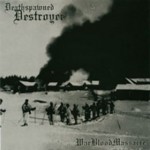 Primitive but astoundingly direct, Deathspawned Destroyer from Huittinen (home of Vordven) has with their two full lengths established Finnish parallels to grindcore influenced bands such as Blood and even Blasphemy but remained widely unnoticed because of a lack of pretension and promotion. While “The First Bestial Butchery” album indulged in gore fantasies of Finnish rural winter madness, “WarBloodMassacre” logically continues to explore real world horrors that happened within the same fields and woods we inhabit here. The shades and violent ghosts of Finnish war history 1939-1945 are not haunted, prophetic or wise in the nearly brainless, stomach churning vision of Deathspawned Destroyer. This is music and lyric of the gut, the trenches and the perpetual dirt. It is Bolt Thrower if it was created by boozing Finnish woodsmen instead of punk influenced British soccer fans. The riffs would probably tell their story as well to men who lived 10,000 years ago, provided they were fighters with hate for the scourge of slavery and love for their home woodlands. The slower parts approximate the atmospheres of Amebix brand of ethereal hardcore. The band gets a chance to try its hand at epic length composition with the more than 10 minute “Doom Before Death” and why the simplicity of structure may make progressive listeners cringe, there is hardly a criticism to be made about the way the parts are elaborated by the cruel lyrics that detail the sufferings of a prisoner of war under torture. The relentless forward driving rhythm and ghoulish voice of the band might be borrowed from the old school, but the vicious, nearly cartoonish black-and-white history flashback is something that needs to be heard to be believed.
Primitive but astoundingly direct, Deathspawned Destroyer from Huittinen (home of Vordven) has with their two full lengths established Finnish parallels to grindcore influenced bands such as Blood and even Blasphemy but remained widely unnoticed because of a lack of pretension and promotion. While “The First Bestial Butchery” album indulged in gore fantasies of Finnish rural winter madness, “WarBloodMassacre” logically continues to explore real world horrors that happened within the same fields and woods we inhabit here. The shades and violent ghosts of Finnish war history 1939-1945 are not haunted, prophetic or wise in the nearly brainless, stomach churning vision of Deathspawned Destroyer. This is music and lyric of the gut, the trenches and the perpetual dirt. It is Bolt Thrower if it was created by boozing Finnish woodsmen instead of punk influenced British soccer fans. The riffs would probably tell their story as well to men who lived 10,000 years ago, provided they were fighters with hate for the scourge of slavery and love for their home woodlands. The slower parts approximate the atmospheres of Amebix brand of ethereal hardcore. The band gets a chance to try its hand at epic length composition with the more than 10 minute “Doom Before Death” and why the simplicity of structure may make progressive listeners cringe, there is hardly a criticism to be made about the way the parts are elaborated by the cruel lyrics that detail the sufferings of a prisoner of war under torture. The relentless forward driving rhythm and ghoulish voice of the band might be borrowed from the old school, but the vicious, nearly cartoonish black-and-white history flashback is something that needs to be heard to be believed.
Haavisto: Our lyrics were far from philosophy and deep meanings. The lyrics of “Reign of Terror” were almost completely taken from “The Diary of Jack the Ripper”, but edited enough to not be a clear plagiarism. On “The First Bestial Butchery” we built new lyrics almost by putting one harsh word after another and looking at the result. We did pay enough attention to lyrics to get one more sensible piece written by someone outside the band: “Autopsy Romance”. The cover art of the album was an idea we had in mind for a long time but had no suitable use before. The second full-length “WarBloodMassacre” was something completely different as the lyrics were entirely done by a person not in the band, with greater care and attention and with the war thematic. I think one can clearly see the main influence at the time being Bolt Thrower. I think the cover art was arranged for by someone at Bestial Burst and very fine they were, thanks for them. A special mention must go to the cover artist of the Bloodhammer/Deathspawned Destroyer split, as one couldn’t make a better representation of the old school spirit. The finest cover art ever.
Jalas: Like I said, Slugathor’s old vocalist Nebiros had quite philosophical lyrical themes. Some lyrics are easy to read, but not that easy to understand right away. They make you think. Well, after he went out of space and started to sing to birds instead of making brutal death noise, we had Axu in the band and he would be the right person to answer about the concept. I’m sure he had his own vision of what is a pure Death Metal lyric.
Pyykkö: The lyrical and graphic concept of Hooded Menace mostly comes from the 70’s Spanish horror film series “The Blind Dead”. That defines our name, the logo and the basic atmosphere of the band. All that slow motion and creepy, menacing mood of those movies are there in Hooded Menace. If you have seen the movies you know what I mean. “The Blind Dead” is the bottom line but there´s more to Hooded Menace than that. We have songs based on other horror films too and some lyrics come from the writer´s own imagination. That sleazy imagination is always strongly influenced by horror movies though! There´s no deeper philosophy to it. We are all about horror! That´s why I sometimes call us as a horror death/doom band. No horror, no Hooded Menace.
 Tuomas K.: Lie in Ruins is conceptually 100% dealing with death, darkness and all things related. After all, this is Death Metal, so the lyrics and the imagery definitely should reflect that.
Tuomas K.: Lie in Ruins is conceptually 100% dealing with death, darkness and all things related. After all, this is Death Metal, so the lyrics and the imagery definitely should reflect that.
Partanen: The nucleus of Sepulchral Aura could be the juxtapositioning of chaos and cosmos, life and death and their intertwined yet paradoxical counter-natures. If one knows the Gnostic text “Thunder Perfect Mind” it could be easier to grasp the drift here. The rest is basically visions and of course experiences transmuted into sound and words. No particular philosophy, but reflections of the path toward self-knowledge by illuminating the shadowed aspects within, self-discipline through warrior and mystic ideals and becoming a higher being.
Holm: For Devilry, National Socialism as an all-encompassing Weltanschauung is the foundation on which everything is built.
Lautamäki: To keep things simple I just say that we are influenced and inspired by a very universal subject called death. Western world has a very sick and unnatural attitude towards such natural thing as death. It is totally ignored or people pretend that it doesn’t even exist while media has demonized it to the point that there are people who really don’t understand that death is something one has to face sooner or later. Not only concerning individuals and families, but one should understand that every civilization and culture will face death as it is seen through history. Only death is real!
Sepulchral Aura: Demonstrational CD MMVII
 Sepulchral Aura is not the first time that mastermind J. Partanen (Second Sun, Aeoga etc.) has picked up the guitar and the drums but it’s the first time he produced a minor classic for the underground to remember from this era of harsh and esoteric Finnish metal. Cryptic, obscurant and violent atonality bursts from Partanen’s figurative composing pen much like Ligeti had developed a passion for speed metal and Death Metal, far from the technical pretensions of the Cynics and Pestilences of the world. Whoever upheld the common misconception that Death Metal is not mysteries and occult metaphor, whoever thought we needed the Black Metal “kvlt” to make us interested in life’s hidden forces and spiritual darkness, had not heard the very dimensional experience Sepulchral Aura engages us in. Lead guitars are non-musical but clear and comprehensible like alien messages sent straight into the brain cortex, vocals are guttural and rasped voices somewhere between animalism and insanity, drums sound like a tribute to old Carcass except for some very idiosyncratic ways to use rhythm and nuance to underline the chaos god that devises the riffs. It is impossible to consider a discussion of this demo that doesn’t mention the legacy of Australian Death Metal and War Metal all the way from Sadistik Exekution to the furthest reaches of Portal and Stargazer. It is very much the resurrection of the sincere belief and primal energy that fueled Bestial Warlust, but in this case consecrated by the wasteland of the North instead of the haunted chasms in Down under.
Sepulchral Aura is not the first time that mastermind J. Partanen (Second Sun, Aeoga etc.) has picked up the guitar and the drums but it’s the first time he produced a minor classic for the underground to remember from this era of harsh and esoteric Finnish metal. Cryptic, obscurant and violent atonality bursts from Partanen’s figurative composing pen much like Ligeti had developed a passion for speed metal and Death Metal, far from the technical pretensions of the Cynics and Pestilences of the world. Whoever upheld the common misconception that Death Metal is not mysteries and occult metaphor, whoever thought we needed the Black Metal “kvlt” to make us interested in life’s hidden forces and spiritual darkness, had not heard the very dimensional experience Sepulchral Aura engages us in. Lead guitars are non-musical but clear and comprehensible like alien messages sent straight into the brain cortex, vocals are guttural and rasped voices somewhere between animalism and insanity, drums sound like a tribute to old Carcass except for some very idiosyncratic ways to use rhythm and nuance to underline the chaos god that devises the riffs. It is impossible to consider a discussion of this demo that doesn’t mention the legacy of Australian Death Metal and War Metal all the way from Sadistik Exekution to the furthest reaches of Portal and Stargazer. It is very much the resurrection of the sincere belief and primal energy that fueled Bestial Warlust, but in this case consecrated by the wasteland of the North instead of the haunted chasms in Down under.
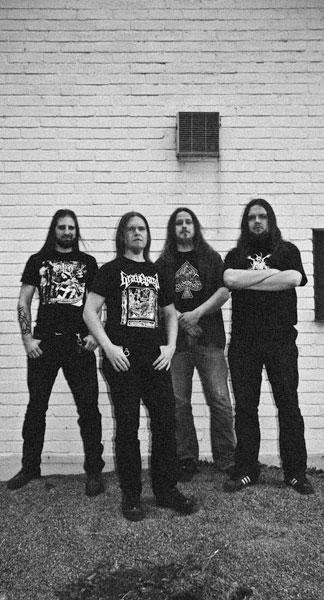 Partanen: Intent and improvisation played a major part in how the music itself turned out to be, so I cannot talk about conscious efforts of tributes to particular bands etc.
Partanen: Intent and improvisation played a major part in how the music itself turned out to be, so I cannot talk about conscious efforts of tributes to particular bands etc.
New Finnish Death Metal is not characterized by particular attributes in sound or can be fitted into one of the trends at large in popular Death Metal, such as fusion Death Metal, “melodic extreme metal” or hyperspeed brutal metal. Most of the bands perform intricate but non-pretentious variations on the classic Scandinavian styling (with lots of Boss Heavy Metal pedals around!), with an emphasis on accuracy and consistency of imagery and lyrics that has been newly found in the Black Metal wave of total art. Trey Azagthoth’s description of Death Metal as a feeling like serpents crawling in the amplifier is very apt in most cases. However, the Death Metal acts mostly wish to keep away from the personality cults and idol worship prevalent in other extreme metal and just keep the music fresh and intuitive.
Haavisto: That’s it. Death Metal is a feeling and when you find the right feel, your material starts to take form and develop and if it sounds a bit familiar already, who cares? It will be new because of the different sound and the feeling transmitted by the end result. It doesn’t need to be that new and special. “The First Bestial Butchery” had the most intense feeling because exactly the one I had about the resulting album was shared by many who listened to it.
Holm: Creating something fresh, Death Metal or not, is utterly unimportant to me. I am more interested in just crafting good songs. Otherwise it should be difficult to relay anything through it successfully.
Jalas: Without listening to any modern or happy shit, I think the variation becomes from small things, changing tempos, repeating riffs but adding a lead guitar. To be honest with these methods it is hard to invent something new, but there are still some ways to invoke the Draco.
Tuomas K.: Actually that description from Mr. Azagthoth is pretty good one! Haven’t heard that one before. As for creating fresh tunes of death, I think it has to do with inspiration first. Sometimes you could have an inspirational rush and just write a whole song from one go. The second option usually is that you dig into your “database” and pick ingredients from here and there and combine those parts to a new song. One thing that is obligatory to play or write Death Metal is a very low tuning on the stringed instruments, at least in my opinion. As for distortion goes, we opt for the Boss HM pedal too, only we don’t use it exactly to get the legendary Sunlight-sound. Add some doomier parts and twisted melodies, and there you go.
Lautamäki: Of those main ingredients listed above we only have the Boss heavy metal pedal which our bassist uses as distortion, so that’s the tiny bit of Swedish sound we have! We always try to deliver crushing and heavy songs which still aim to attach the mystical and ethereal feeling through dissonant melodies and solos inspired by mysteries of death and decay.
Ascended: The Temple of Dark Offerings EP
 It seems sometimes like a wonder that so many Death Metal classics have been created by youngsters working on their first demo, EP or album but clearly it is a basis for less calculated and more intense statements of the primal truths these eyes have witnessed on their journey so far on earth. While the least experienced musicians on the list, Ascended from Pori prove not one bit worse in channeling the breath of exhumed grave into the nostrils of the expectant Death Metal fan. Simple but glorious, Ascended likes to keep it slow and groove onwards through melodies that recall old Tiamat, Slayer and even a bit of Black Metal. Much like Mystifier or Necros Christos, vocals intone an animated ritual chant to the dead in an almost numbingly rhythmic and non-varied manner. Sound is sparse and clear, with a surprising gap in the lower register lending the proceedings an airy, ethereal vibe of darkness. The foreboding calm of tracks such as “Wedlock of Lust” or the multi-part “Mesmerizing Stench” should be obligatory lessons for most of this generation’s Black Metal bands in what they have missed in pacing and atmospheres of evil. Technical ability and pages of morbid theology do not substitute for the realm of visions and subdued melodies that remind mortals of that which shall be over all too soon – the summer of life, clouded by the storms of the unknown, while the reaper grins to you in the horizon.
It seems sometimes like a wonder that so many Death Metal classics have been created by youngsters working on their first demo, EP or album but clearly it is a basis for less calculated and more intense statements of the primal truths these eyes have witnessed on their journey so far on earth. While the least experienced musicians on the list, Ascended from Pori prove not one bit worse in channeling the breath of exhumed grave into the nostrils of the expectant Death Metal fan. Simple but glorious, Ascended likes to keep it slow and groove onwards through melodies that recall old Tiamat, Slayer and even a bit of Black Metal. Much like Mystifier or Necros Christos, vocals intone an animated ritual chant to the dead in an almost numbingly rhythmic and non-varied manner. Sound is sparse and clear, with a surprising gap in the lower register lending the proceedings an airy, ethereal vibe of darkness. The foreboding calm of tracks such as “Wedlock of Lust” or the multi-part “Mesmerizing Stench” should be obligatory lessons for most of this generation’s Black Metal bands in what they have missed in pacing and atmospheres of evil. Technical ability and pages of morbid theology do not substitute for the realm of visions and subdued melodies that remind mortals of that which shall be over all too soon – the summer of life, clouded by the storms of the unknown, while the reaper grins to you in the horizon.
Hooded Menace: Fulfill the Curse
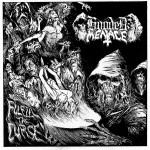 Perhaps no other themes in metal have suffered such an ugly abuse as those of gothic horror and its symbolic exploration of the unconscious, sexual and paranoid impulse within man. As plastic, theatrical and money-hungry hedonists swarmed like a pack of rats to invade Death Metal and Black Metal record labels, they left behind a legacy of fear which caused later audiences to abhor the careful and elegant treatment of the macabre that was the original intention of bands like Paradise Lost and My Dying Bride, before the same bands’ later development infused it with a homosexual taint. While Hooded Menace has not yet produced a work to outweigh the elders, it’s done more than its share in reviving hope in a form with plenty of potential. If there is one thing that has been sadly lacking in the last decade of Death Metal, it’s beautiful and clever melodies. Led by veterans from Joensuu’s progressive Death Metal cult Phlegethon, Hooded Menace pounds, thrashes and makes dramatic gestures of sweeping funereal melodies perfect for a Candlemass album while the lyrics are growled by Lasse Pyykkö (“Leper Messiah”) as absurdist anecdotes straight from 50’s B-grade horror movies.
Perhaps no other themes in metal have suffered such an ugly abuse as those of gothic horror and its symbolic exploration of the unconscious, sexual and paranoid impulse within man. As plastic, theatrical and money-hungry hedonists swarmed like a pack of rats to invade Death Metal and Black Metal record labels, they left behind a legacy of fear which caused later audiences to abhor the careful and elegant treatment of the macabre that was the original intention of bands like Paradise Lost and My Dying Bride, before the same bands’ later development infused it with a homosexual taint. While Hooded Menace has not yet produced a work to outweigh the elders, it’s done more than its share in reviving hope in a form with plenty of potential. If there is one thing that has been sadly lacking in the last decade of Death Metal, it’s beautiful and clever melodies. Led by veterans from Joensuu’s progressive Death Metal cult Phlegethon, Hooded Menace pounds, thrashes and makes dramatic gestures of sweeping funereal melodies perfect for a Candlemass album while the lyrics are growled by Lasse Pyykkö (“Leper Messiah”) as absurdist anecdotes straight from 50’s B-grade horror movies.
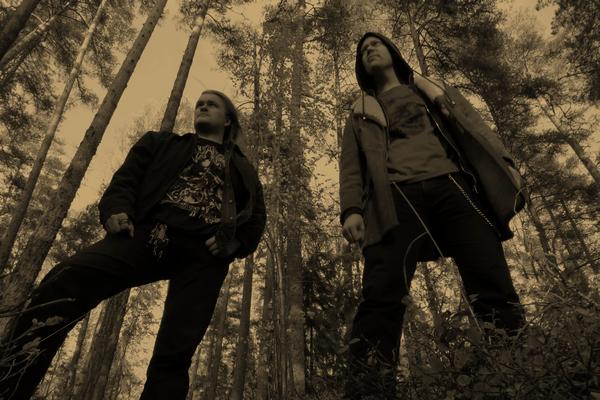 The apparent cheapness of “Grasp of the Beastwoman” or “Theme from Manhattan Baby” is offset by the care and calculation which proves that Hooded Menace has a profound affection for its infantile source material. This trait establishes a profound link with the old school of Death Metal, the musical manifestation of the gore and trash movie obsessions of kids whose awareness of the relevance of death and morbidity to philosophical discourse was only intuitive and spontaneous.
The apparent cheapness of “Grasp of the Beastwoman” or “Theme from Manhattan Baby” is offset by the care and calculation which proves that Hooded Menace has a profound affection for its infantile source material. This trait establishes a profound link with the old school of Death Metal, the musical manifestation of the gore and trash movie obsessions of kids whose awareness of the relevance of death and morbidity to philosophical discourse was only intuitive and spontaneous.
Pyykkö: We owe a lot to bands like Candlemass, Cathedral and Winter. It´s not about paying tribute, it´s about making as good slow Death Metal as we can. It´s not a tribute for tribute´s sake, you know. This band is very natural thing actually. When I write metal songs I don´t try to be old school. I am “old” and schooled during the golden days of Death Metal so old school is pretty much what comes out whether I wanted or not. One reason why we decided to form this band was because we thought there weren´t enough decent Death/Doom bands around. We use the elements that we think will make the greatest slow Death Metal. This is our vision of how this type of music should sound at its best. Basically what we do is, I´m going really black and white now, recycle all those Candlemass and Cathedral riffs, throw in some creepy Death Metal vocals and spice it up with some horror soundtrack influences. We just know what elements there has to be in our songs… or at least we know what elements we definitely don´t want to include! It´s not hard actually. It all comes out very naturally. I bet you could tell if we sounded forced. The result is something that in some putrid way sounds fresh… at least to our ears it does, and that´s pretty much enough to keep us going.
The Lords of the Shadow Realm: The Future of Finnish Death
 While most media continues to highlight the hyped up Heavy, Black and Doom bands from the Land of the Thousand Lakes, we at Deathmetal.Org wish to raise a mighty salute to the legions of blasphemy and resistance who are spreading evil Death Metal amidst the wastelands of the frozen North. Unique, demanding and powerful, these bands are not in the way to become the next big thing in Death Metal, but I have the sincere hope that each reader will find something in this diverse assortment that speaks to him in the voice of transcendental communication which is the reason we have been interested in this art for all these years. These hordes will either dominate the world or rule in shadows.
While most media continues to highlight the hyped up Heavy, Black and Doom bands from the Land of the Thousand Lakes, we at Deathmetal.Org wish to raise a mighty salute to the legions of blasphemy and resistance who are spreading evil Death Metal amidst the wastelands of the frozen North. Unique, demanding and powerful, these bands are not in the way to become the next big thing in Death Metal, but I have the sincere hope that each reader will find something in this diverse assortment that speaks to him in the voice of transcendental communication which is the reason we have been interested in this art for all these years. These hordes will either dominate the world or rule in shadows.
Pyykkö: Well, you never know about the future. I´d be happy with ruling in shadows, haha! Hooded Menace will never be hugely popular anyway. My ambition has always been to beat myself. To keep on making decent music as long as it´s fun, passionate and exciting. You possibly have noticed there have been some changes to the lineup after the “Fulfill the Curse” album. The other guys left the city of Joensuu because of work and studies so now Hooded Menace is a duo with me on vocals, guitars and bass and Pekka on drums. Pekka was an easy and pretty obvious choice since I already play with him in Vacant Coffin. As long as we don´t want to play live we can work as a duo like forever but sure a bass player would be nice for the rehearsals. It can get a bit boring to rehearse the songs as a twosome. Our next move in “spreading evil” is of course to release our 2nd album. That should be out sometime in the first half of 2010 on Profound Lore!
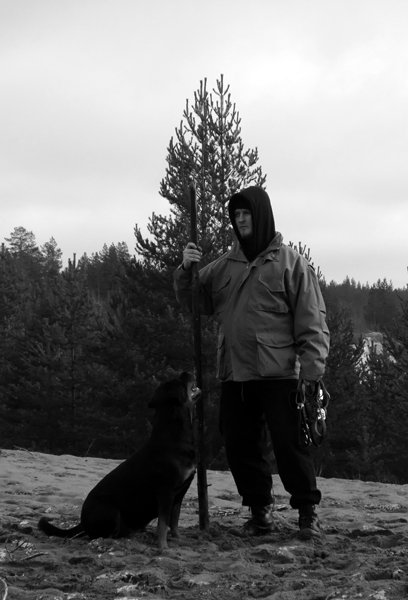 Haavisto: Once Lehtinen quit playing after the second Deathspawned Destroyer album, it meant an almost complete stop to our activity. We did two promising tracks with our new member Tuomas Murtojärvi, but we didn’t really get it properly going so the band and the Death Metal spirit has drifted away. People tend to have so much other things to do and the most important band related people have moved so far from us that when we have the occasional practice we play something totally different from Deathspawned Destroyer. The modern day Death Metal people seem anyway to be in a different world and there doesn’t seem to be a demand for old school ruckus. At least not among the “metalheads” seen in the streets around here. I haven’t followed either the recent developments in Death Metal, because the new bands don’t interest me one bit and the old ones have been devoured through and through many times. Deathspawned Destroyer rests in the shadows and maybe one day will be back and do something worth listening to… maybe. We need a guitarist who has a regular commitment to the project and who cares more about the attitude than playing right. It’s certain that things won’t work out again with the original Deathspawned Destroyer duo, but there’s no strife related to it. Hails to Lehtinen and everyone else who supported Deathspawned Destroyer and were a part of our activity in one way or another!
Haavisto: Once Lehtinen quit playing after the second Deathspawned Destroyer album, it meant an almost complete stop to our activity. We did two promising tracks with our new member Tuomas Murtojärvi, but we didn’t really get it properly going so the band and the Death Metal spirit has drifted away. People tend to have so much other things to do and the most important band related people have moved so far from us that when we have the occasional practice we play something totally different from Deathspawned Destroyer. The modern day Death Metal people seem anyway to be in a different world and there doesn’t seem to be a demand for old school ruckus. At least not among the “metalheads” seen in the streets around here. I haven’t followed either the recent developments in Death Metal, because the new bands don’t interest me one bit and the old ones have been devoured through and through many times. Deathspawned Destroyer rests in the shadows and maybe one day will be back and do something worth listening to… maybe. We need a guitarist who has a regular commitment to the project and who cares more about the attitude than playing right. It’s certain that things won’t work out again with the original Deathspawned Destroyer duo, but there’s no strife related to it. Hails to Lehtinen and everyone else who supported Deathspawned Destroyer and were a part of our activity in one way or another!
Tuomas K.: I think our ambition with Lie in Ruins is to create and release Death Metal which we find satisfying for ourselves. If there comes a time that I or we shouldn’t be satisfied with our work, I guess we should call it a day or at least take a timeout. If there should be any ambitions to create other kind of music, I think it should done under a different moniker, which I think that some of those old bands should’ve done as well.
Holm: There is no ambition in ruling in shadows. We already are. Supreme in the league of our own. That is where Devilry will stay too. Anything else would be doomed to fail.
Jalas: We never even thought about making some commercial music with Slugathor. I’m now proud to end this band without wimping out or changing style of music. I think we had our share of influence in the younger generation of Death Metal. It is unbelievable to notice that some new bands have started to sound
exactly like Death Metal is supposed to sound (1989-1991 era), even though they were hardly even born when those old bands recorded their classic demos or debut albums. Slugathor’s last offering of darkness will be a mini-album, in totalitarian Slugathor style, no compromise here either. We have played our last concert in Semifinal, Helsinki with Stench of Decay and Lie in Ruins. The band will be put on it’s already open grave, after a decade. Actually now when Slugathor’s time is over, me and Antti have decided to work on some very obscure and dark Death Metal. We just can’t stop this. Also the rest of Slugathor memebers are going to work on with their own musical projects. Which suits me the best “to dominate the world”, or “to rule in shadows”? I would choose the latter option.
Lautamäki: Ascended’s next big move is going to be a full-length. The process is delayed because of military service, but in Autumn 2010 we should be able to rehearse again with full lineup and maybe record the material by the end of the year. There’s plenty of material already written up, but there is just no time to rehearse it. One thing I can still promise is that the album is going to be nothing else than honest Death Metal. The only negative thing I can think of is that it is very hard to organize rehearsals since we have 5 members in the lineup.
Partanen: Also playing alone creates some practical obstacles, but they can be surpassed. I would prefer a real line-up, but due to certain aspects of the nature of SA, it is better to continue this way, at least for now. It is to become one with the shadows. Next release will be in 7″, 10″, or full-length format, but do not ask me when. The worthy music is visions, dreams, thoughts, discipline, magic, feeling and intent. The rest is a physical act. If you can smell the stench of transcendental death while playing, at least something is right. If you can see death, even better. If you die, best!
Tags: ascended, death metal, deathspawned destroyer, devilry, Finland, Finnish Death Metal, Hooded Menace, lie in ruins, sepulchral aura, slugathor, zine-zines
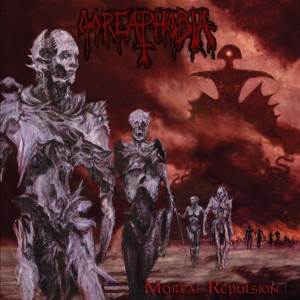
 TIMEGHOUL are one of those death metal rarities: a band with only demo-level output that often outshines that of their more well known peers. Their brand of American-styled death metal was complex, eclectic and, most importantly, constructed on a foundation of solid songwriting and and intriguing concept. Guitarist Gordon Blodgett was kind enough to speak to us about their obscure legacy.
TIMEGHOUL are one of those death metal rarities: a band with only demo-level output that often outshines that of their more well known peers. Their brand of American-styled death metal was complex, eclectic and, most importantly, constructed on a foundation of solid songwriting and and intriguing concept. Guitarist Gordon Blodgett was kind enough to speak to us about their obscure legacy.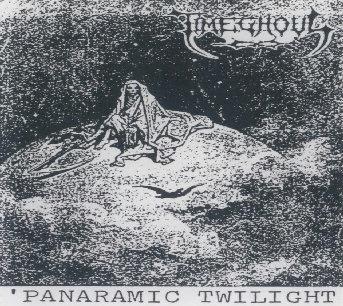 I have seen the TIMEGHOUL lyrics described as “fantasy,” which seems true. Like all good fantasy though, some seem to be truth buried under complex metaphor. They are also very well composed. Was there any kind of meta-concept, or were they written as seperate short stories that happened to play out well as lyrics?
I have seen the TIMEGHOUL lyrics described as “fantasy,” which seems true. Like all good fantasy though, some seem to be truth buried under complex metaphor. They are also very well composed. Was there any kind of meta-concept, or were they written as seperate short stories that happened to play out well as lyrics?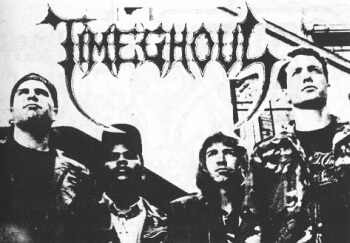
 Coming from the anarcho-punk school of musical and ideological tradition, and finally releasing this, their debut full length in 1985, Amebix had already released a series of excellent EP’s in the early half of the decade. The unique character of their music was a sound that fused the violent hardcore punk of Discharge with the circulative, repetitious song structures that were a staple of post-punk acts such as Killing Joke and Public Image Ltd. Escaping the social-activist themes that were a staple of hardcore, and transcending the melancholia and fatalism that was a common theme of post-punk, Amebix took on board the musical apparatus of both substyles and turned towards a contemplative, naturalistic direction that subverted the generalisation of how we associate themes with forms. Inspiration comes additionally from the NWOBHM of early Motorhead and Judas Priest in the crunching, percussive guitar playing that made itself a staple of speed metal and subsequently death metal. Drums batter clearly as if to stadium anthems, and boom with an echo one would clearly associate with said decade. Droning riffs make an appearance and have a harmonic depth to them that evoke the archaic and the dystopian much like Burzum and Godflesh simultaneously would do in their most prominent work. Whereas the metal subgenres of the 1980′s slowly influenced one anothers musical language, Amebix single handedly introduced new themes and formats that would become the structural basis of future acts to come, and alongside their compilation album No Sanctuary, this important work deserves it’s applause.
Coming from the anarcho-punk school of musical and ideological tradition, and finally releasing this, their debut full length in 1985, Amebix had already released a series of excellent EP’s in the early half of the decade. The unique character of their music was a sound that fused the violent hardcore punk of Discharge with the circulative, repetitious song structures that were a staple of post-punk acts such as Killing Joke and Public Image Ltd. Escaping the social-activist themes that were a staple of hardcore, and transcending the melancholia and fatalism that was a common theme of post-punk, Amebix took on board the musical apparatus of both substyles and turned towards a contemplative, naturalistic direction that subverted the generalisation of how we associate themes with forms. Inspiration comes additionally from the NWOBHM of early Motorhead and Judas Priest in the crunching, percussive guitar playing that made itself a staple of speed metal and subsequently death metal. Drums batter clearly as if to stadium anthems, and boom with an echo one would clearly associate with said decade. Droning riffs make an appearance and have a harmonic depth to them that evoke the archaic and the dystopian much like Burzum and Godflesh simultaneously would do in their most prominent work. Whereas the metal subgenres of the 1980′s slowly influenced one anothers musical language, Amebix single handedly introduced new themes and formats that would become the structural basis of future acts to come, and alongside their compilation album No Sanctuary, this important work deserves it’s applause. Following up the band’s debut album Tol Cormpt Norz Norz Norz, Impaled Nazarene opened the silo once again to release their deadliest missile of truly
Following up the band’s debut album Tol Cormpt Norz Norz Norz, Impaled Nazarene opened the silo once again to release their deadliest missile of truly 




 Histories of early black metal are dime a dozen nowadays and by now you probably know how Mayhem and Burzum came about, if you are interested, and have figured out why the churches were burnt, if you are intelligent. However, what happened after 1995 is rarely put under reasonable scrutiny because as in politics, recent events contain too much unexposed lies and hidden agendas to bear daylight.
Histories of early black metal are dime a dozen nowadays and by now you probably know how Mayhem and Burzum came about, if you are interested, and have figured out why the churches were burnt, if you are intelligent. However, what happened after 1995 is rarely put under reasonable scrutiny because as in politics, recent events contain too much unexposed lies and hidden agendas to bear daylight.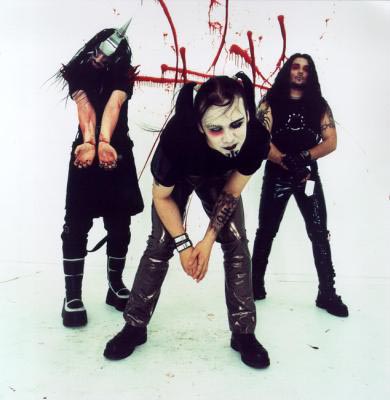 The Internet grew into a unifying, though disputed and hated, medium for the black metal underground to bicker about trivialities, form projects and spread news and gossip. Forums and websites contained information about hundreds of new bands, far from the old realm of tape traders and fanatics who kept meticulous contact with friends abroad through letters and phone calls. Also, the beloved underground zine, responsible for establishing the mystique around the early 90s black metal scene, was relegated to minor status as an upholder of the cursed movement.
The Internet grew into a unifying, though disputed and hated, medium for the black metal underground to bicker about trivialities, form projects and spread news and gossip. Forums and websites contained information about hundreds of new bands, far from the old realm of tape traders and fanatics who kept meticulous contact with friends abroad through letters and phone calls. Also, the beloved underground zine, responsible for establishing the mystique around the early 90s black metal scene, was relegated to minor status as an upholder of the cursed movement. The black metal underground adopted more and more extreme stances to make them impenetrable to the masses that were threatening to turn black metal into a parody and a freakshow. One of these positions was the National Socialist black metal, which had been already perpetrated in the early 90s by Absurd and Lord of Evil but failed to become a widespread movement until the end of the decade when the Allgermanische Heidnische Front and the Pagan Front along with, intentionally or not, Moynihan’s and Søderlund’s book Lords of Chaos promoted the mixture of national traditionalism and romantic black metal, to the disgust of the part of the scene retaining the leftist influence from grindcore.
The black metal underground adopted more and more extreme stances to make them impenetrable to the masses that were threatening to turn black metal into a parody and a freakshow. One of these positions was the National Socialist black metal, which had been already perpetrated in the early 90s by Absurd and Lord of Evil but failed to become a widespread movement until the end of the decade when the Allgermanische Heidnische Front and the Pagan Front along with, intentionally or not, Moynihan’s and Søderlund’s book Lords of Chaos promoted the mixture of national traditionalism and romantic black metal, to the disgust of the part of the scene retaining the leftist influence from grindcore. For another segment of the underground, the message chosen was as corrupted, cryptic and vile as possible. Inspired by the first incarnation of black metal and of everything that was filthy and anti-social in the underground, satanic nihilists waged war on everything, as exemplified by the album titles Cut Your Flesh and Worship Satan (Antaeus) and Kill Yourself or Someone You Love (Krieg). The actual message was hidden under the surface, for it utilized spewed vitriol for an introverted self-study, which was concealed as an attack. The Satanists and nihilists considered worldly things as folly, a curse imposed by God or nature upon the Faustian soul – all attachment and love in fleshly things was false figments of illusion, much like the Gnostic Christians believed.
For another segment of the underground, the message chosen was as corrupted, cryptic and vile as possible. Inspired by the first incarnation of black metal and of everything that was filthy and anti-social in the underground, satanic nihilists waged war on everything, as exemplified by the album titles Cut Your Flesh and Worship Satan (Antaeus) and Kill Yourself or Someone You Love (Krieg). The actual message was hidden under the surface, for it utilized spewed vitriol for an introverted self-study, which was concealed as an attack. The Satanists and nihilists considered worldly things as folly, a curse imposed by God or nature upon the Faustian soul – all attachment and love in fleshly things was false figments of illusion, much like the Gnostic Christians believed. The aesthetic defined by Mayhem on the classic De Mysteriis Dom Sathanas, an amalgamation of the theological and the heretical, a re-interpretation of the sacred writings of Christianity, was given a full treatment by bands that musically attempted to find a balance between the creation of “experimental” black metal and “true” black metal (essentially two trends that had been around since new black metal became mostly home recorded and free of quality expectations).
The aesthetic defined by Mayhem on the classic De Mysteriis Dom Sathanas, an amalgamation of the theological and the heretical, a re-interpretation of the sacred writings of Christianity, was given a full treatment by bands that musically attempted to find a balance between the creation of “experimental” black metal and “true” black metal (essentially two trends that had been around since new black metal became mostly home recorded and free of quality expectations). The target audience, which was mostly composed of young, sensitive, intelligent and fragmented personalities with an emotional attachment to the mystique of Satan and Christianity, mostly liked it since the music was tried and true melodic black metal not far from that of the eternal crowd favorites Marduk and Dissection, with updated imagery and lyrics. It was also suitable to the retro-purist tendency to reject political developments in black metal on the grounds that such were not originally a part of it, despite the fact that they themselves introduced many aspects such as the Bible quotations and theological analysis which belonged to it even less.
The target audience, which was mostly composed of young, sensitive, intelligent and fragmented personalities with an emotional attachment to the mystique of Satan and Christianity, mostly liked it since the music was tried and true melodic black metal not far from that of the eternal crowd favorites Marduk and Dissection, with updated imagery and lyrics. It was also suitable to the retro-purist tendency to reject political developments in black metal on the grounds that such were not originally a part of it, despite the fact that they themselves introduced many aspects such as the Bible quotations and theological analysis which belonged to it even less. The pagan warriors fared a little better on the quest for Romantic, neo-classical black metal art. The core bands of nationalist pagan black metal, such as Totenburg, Heldentum and Eisenwinter, realized a synthesis of the street punks’ (through Oi and RAC) music with folk and heavy metal and some of the naturalistic black metal instinct of Ildjarn and Burzum. These bands steered clean from pleasing the public with melodic death metal influences or digital production standards, while many others such as Temnozor, Kroda, later Forest and Graveland, led their epics by vocal and folk instrument melodies, influences from symphonic soundtracks and recurring Hammerheart–era Bathory riffs, mostly in rock format.
The pagan warriors fared a little better on the quest for Romantic, neo-classical black metal art. The core bands of nationalist pagan black metal, such as Totenburg, Heldentum and Eisenwinter, realized a synthesis of the street punks’ (through Oi and RAC) music with folk and heavy metal and some of the naturalistic black metal instinct of Ildjarn and Burzum. These bands steered clean from pleasing the public with melodic death metal influences or digital production standards, while many others such as Temnozor, Kroda, later Forest and Graveland, led their epics by vocal and folk instrument melodies, influences from symphonic soundtracks and recurring Hammerheart–era Bathory riffs, mostly in rock format. An esoteric nationalism, inspired by traditionalists Evola and Guénon and by philosophers Nietzsche and Bergson, also emerged, and was more sophisticated than the crude hedonism of LaVey or the superstitions of Elizabethan Devil worshippers. But when presented to the working class it meant believing that the sickness of the world is a manifestation of the plots of other races, particularly the Jews, for the subversion of the higher culture of the White Aryan.
An esoteric nationalism, inspired by traditionalists Evola and Guénon and by philosophers Nietzsche and Bergson, also emerged, and was more sophisticated than the crude hedonism of LaVey or the superstitions of Elizabethan Devil worshippers. But when presented to the working class it meant believing that the sickness of the world is a manifestation of the plots of other races, particularly the Jews, for the subversion of the higher culture of the White Aryan.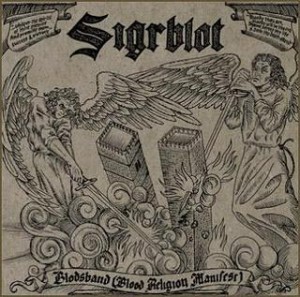 The ideology did not encourage escapism through occult and religious experience, or delving deep into the decadent side of modern society. Nor did it deny any of the basic wishes and instincts of man such as having a constructive job, raising a family or having a good time with friends and warriors. But the stigma — and in some countries, criminality — of the symbology forced the adherents to always be careful, prepare for confrontation and face all the consequences of the living the worst possible implications of his ideal.
The ideology did not encourage escapism through occult and religious experience, or delving deep into the decadent side of modern society. Nor did it deny any of the basic wishes and instincts of man such as having a constructive job, raising a family or having a good time with friends and warriors. But the stigma — and in some countries, criminality — of the symbology forced the adherents to always be careful, prepare for confrontation and face all the consequences of the living the worst possible implications of his ideal. It was one of the most two-faced cults seen in metal – extremely powerful symbolism and literature was abused by people who constantly admitted to failure and self-defeated feelings in the guise of a reborn Gnostic/Jesuit theology that denies the world having anything of value. Artists and philosophers gave long and explanatory answers in interviews that were too difficult for the majority to understand and thus ended up taken out of context. Many, though, considered this the natural way of “evil”: the weak and the stupid deserve to be corrupted, driven into suicide, fear and madness by the power of Lucifer’s light.
It was one of the most two-faced cults seen in metal – extremely powerful symbolism and literature was abused by people who constantly admitted to failure and self-defeated feelings in the guise of a reborn Gnostic/Jesuit theology that denies the world having anything of value. Artists and philosophers gave long and explanatory answers in interviews that were too difficult for the majority to understand and thus ended up taken out of context. Many, though, considered this the natural way of “evil”: the weak and the stupid deserve to be corrupted, driven into suicide, fear and madness by the power of Lucifer’s light. If one is allowed to bluntly generalize, one tends to see on message boards nationalists expressing themselves with a crude, uneducated language reminiscent of trailer park fascism, yet having a solid idea worthy of being developed further, a meaning behind the words. On the other hand a Theistic Satanist can easily lecture you on the Blavatskyan concept of Ego as Lucifer, or on the problems of empirical science, but one is left quite unsure why it is important.
If one is allowed to bluntly generalize, one tends to see on message boards nationalists expressing themselves with a crude, uneducated language reminiscent of trailer park fascism, yet having a solid idea worthy of being developed further, a meaning behind the words. On the other hand a Theistic Satanist can easily lecture you on the Blavatskyan concept of Ego as Lucifer, or on the problems of empirical science, but one is left quite unsure why it is important.
 Entombed played a set that disappointed, and this was partially due a lack of their better material being played. Much of the setlist consisted of numbers that were lifted from their third full-length, Wolverine Blues and then onwards, with a lack of attention given to their more pioneering work that was put out on their first two albums, Left Hand Path and Clandestine. Songs were less death metal than they were an aggressive take on stoner rock, songs being much more inclined to the verse/chorus school of rock songwriting, the rhythms more inclined to provoke the shaking of hips and the tapping of feet than they were to bang heads. Whilst this was all good and competent, certainly the great soundtrack of an alcohol fueled evening in the capital of Eire, none of these works, as far as the reviewers opinion is concerned had the violent charge nor the momentum that characterized their legendary debut. Some credit will be given to the vocalist, whose onstage presence and frantic onstage manners gave more depth and urgency to songs that otherwise were devoid of it, and the guitarists tone was brilliant, the same buzzing, ‘chainsaw’ like tone that they helped pioneer back in the early nineties through maximum amplification. Entombed concluded their set with a brilliant rendition of Left Hand Path the staple and title track of their debut album, and it put a redeeming conclusion to what was an expertly performed, yet borderline mediocre set on occasions. It would be wonderful to hear what paths could be treaded if they realise the urgency that made their earlier music essential.
Entombed played a set that disappointed, and this was partially due a lack of their better material being played. Much of the setlist consisted of numbers that were lifted from their third full-length, Wolverine Blues and then onwards, with a lack of attention given to their more pioneering work that was put out on their first two albums, Left Hand Path and Clandestine. Songs were less death metal than they were an aggressive take on stoner rock, songs being much more inclined to the verse/chorus school of rock songwriting, the rhythms more inclined to provoke the shaking of hips and the tapping of feet than they were to bang heads. Whilst this was all good and competent, certainly the great soundtrack of an alcohol fueled evening in the capital of Eire, none of these works, as far as the reviewers opinion is concerned had the violent charge nor the momentum that characterized their legendary debut. Some credit will be given to the vocalist, whose onstage presence and frantic onstage manners gave more depth and urgency to songs that otherwise were devoid of it, and the guitarists tone was brilliant, the same buzzing, ‘chainsaw’ like tone that they helped pioneer back in the early nineties through maximum amplification. Entombed concluded their set with a brilliant rendition of Left Hand Path the staple and title track of their debut album, and it put a redeeming conclusion to what was an expertly performed, yet borderline mediocre set on occasions. It would be wonderful to hear what paths could be treaded if they realise the urgency that made their earlier music essential. Amon Amarth played an excellent and intense set, mostly consisting of the melodic, fluid and anthemic traditional metal that they have come to be easily associated with. Infectious melodies and precise, double-bass lead drum rhythms bring to mind a hybrid of Blind Guardian and late period Immortal, whilst the muscle and simplicity of their music brings to mind fellow countrymen Unleashed in both the subject matter and the simplicity of the song structures. Musically Amon Amarth have an obvious strong commercial potential, sound highly accessible by the subgenre’s standards, and whilst they are not exactly breaking any new artistic ground, they are still workmanlike and this shows in what was a very well received and well performed set. Johan Hegg is a good front man and throughout the set uses the opportunity to incite the audience to terrace chant amidst his bellowing, whilst taking turns to consume from the mead horn that is his custom to bring on stage with him. Admittedly I would not consider these to be an act of the highest caliber, though they are unique in that they have one foot stood in the primitive and barbaric, with one firmly in the ability to reach out to a large audience. It was a privilege to be involved among the audience that night.
Amon Amarth played an excellent and intense set, mostly consisting of the melodic, fluid and anthemic traditional metal that they have come to be easily associated with. Infectious melodies and precise, double-bass lead drum rhythms bring to mind a hybrid of Blind Guardian and late period Immortal, whilst the muscle and simplicity of their music brings to mind fellow countrymen Unleashed in both the subject matter and the simplicity of the song structures. Musically Amon Amarth have an obvious strong commercial potential, sound highly accessible by the subgenre’s standards, and whilst they are not exactly breaking any new artistic ground, they are still workmanlike and this shows in what was a very well received and well performed set. Johan Hegg is a good front man and throughout the set uses the opportunity to incite the audience to terrace chant amidst his bellowing, whilst taking turns to consume from the mead horn that is his custom to bring on stage with him. Admittedly I would not consider these to be an act of the highest caliber, though they are unique in that they have one foot stood in the primitive and barbaric, with one firmly in the ability to reach out to a large audience. It was a privilege to be involved among the audience that night.